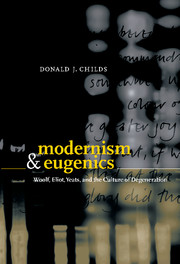Book contents
- Frontmatter
- Contents
- Introduction
- Chapter 1 Virginia Woolf's hereditary taint
- Chapter 2 Boers, whores, and Mongols in Mrs. Dalloway
- Chapter 3 Body and biology in A Room of One's Own
- Chapter 4 Eliot on biology and birthrates
- Chapter 5 To breed or not to breed: the Eliots' question
- Chapter 6 Fatal fertility in The Waste Land
- Chapter 7 The late eugenics of W.B. Yeats
- Chapter 8 Yeats and stirpiculture
- Chapter 9 Yeats and The Sexual Question
- Notes
- Index
Chapter 9 - Yeats and The Sexual Question
Published online by Cambridge University Press: 22 September 2009
- Frontmatter
- Contents
- Introduction
- Chapter 1 Virginia Woolf's hereditary taint
- Chapter 2 Boers, whores, and Mongols in Mrs. Dalloway
- Chapter 3 Body and biology in A Room of One's Own
- Chapter 4 Eliot on biology and birthrates
- Chapter 5 To breed or not to breed: the Eliots' question
- Chapter 6 Fatal fertility in The Waste Land
- Chapter 7 The late eugenics of W.B. Yeats
- Chapter 8 Yeats and stirpiculture
- Chapter 9 Yeats and The Sexual Question
- Notes
- Index
Summary
In the late 1990s, many in Switzerland were distressed to learn that the person whose face had adorned the Swiss 1,000 franc bank note since 1978 was a eugenist responsible for the canton of Vaud's 1928 sterilization law – a law sanctioning the sterilization of, among others, the “feeble-minded, morally weak, idiotic and promiscuous,” and a law admired by the most infamous eugenist of all, Adolf Hitler himself. The face on the country's largest denomination bill was that of Auguste Forel – not only a eugenist, but also one of Europe's most prominent neurophysiologists at the end of the nineteenth century (parts of the brain are named after him) and, at the beginning of the twentieth century, one of its most prominent psychiatrists – author of the popular guide to sexual hygiene that Yeats owned.
First published as Die sexuelle Frage (1905), Forel's book The Sexual Question took its place alongside Havelock Ellis's Studies in the Psychology of Sex (1897–1928), Richard Krafft-Ebing's Psycopathia Sexualis (1902), and Sigmund Freud's works as a seminal influence in the twentieth century's so-called sexual revolution. Understanding themselves to be destroying the conspiracy of silence about sex, understood by their societies to be violating taboos, understood by Foucault to be agents for the incorporation of the body within the production of truth by scientific discursivity (“It was a time when the most singular pleasures were called upon to pronounce a discourse of truth concerning themselves, a discourse which had to model itself after that which spoke … of bodies and life processes – the discourse of science”), these figures were and remain notorious – whether prosecuted by Foucault or, in Ellis's case, by the British courts.
- Type
- Chapter
- Information
- Modernism and EugenicsWoolf, Eliot, Yeats, and the Culture of Degeneration, pp. 203 - 230Publisher: Cambridge University PressPrint publication year: 2001



